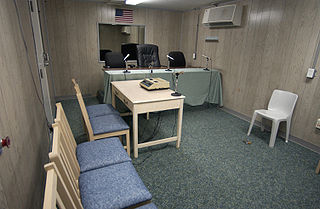
An unlawful combatant, illegal combatant or unprivileged combatant/belligerent is, according to United States law, a person who directly engages in armed conflict in violation of the laws of war and therefore is claimed to not be protected by the Geneva Conventions. The International Committee of the Red Cross points out that the terms "unlawful combatant", "illegal combatant" or "unprivileged combatant/belligerent" are not defined in any international agreements.

The Combatant Status Review Tribunals (CSRT) were a set of tribunals for confirming whether detainees held by the United States at the Guantanamo Bay detention camp had been correctly designated as "enemy combatants". The CSRTs were established July 7, 2004 by order of U.S. Deputy Secretary of Defense Paul Wolfowitz after U.S. Supreme Court rulings in Hamdi v. Rumsfeld and Rasul v. Bush and were coordinated through the Office for the Administrative Review of the Detention of Enemy Combatants.
Salah Abdul Rasool Al Blooshi is a Bahraini, who was held in extrajudicial detention in the United States Guantanamo Bay detainment camps, in Cuba.
Competent Tribunal is a term used in Article 5 paragraph 2 of the Third Geneva Convention, which states:
Should any doubt arise as to whether persons, having committed a belligerent act and having fallen into the hands of the enemy, belong to any of the categories enumerated in Article 4, such persons shall enjoy the protection of the present Convention until such time as their status has been determined by a competent tribunal.
Peter E. Brownback III is a retired military officer and lawyer. He was appointed in 2004 by general John D. Altenburg as a Presiding Officer on the Guantanamo military commissions. The Washington Post reported: "...that Brownback and Altenburg have known each other since 1977, that Brownback's wife worked for Altenburg, and that Altenburg hosted Brownback's retirement party in 1999."

Mohammed Nechle is a Bosnian citizen who was wrongly held for almost seven years as an "enemy combatant" in the United States's Guantanamo Bay detention camps, in Cuba.
Adil Kamil Abdullah Al Wadi is a citizen of Bahrain who was held in extrajudicial detention in the United States Guantanamo Bay detainment camps, in Cuba. Al Wadi's Guantanamo Internment Serial Number was 60. American intelligence analysts estimate that Al Wadi was born in 1964, in Muharraq, Bahrain.
Hajji Shahzada is a citizen of Afghanistan who was held in extrajudicial detention in the United States Guantanamo Bay detention camps, in Cuba. Shahzada's Guantanamo Internment Serial Number was 952. Joint Task Force Guantanamo counter-terrorism analysts estimate that Shahzada was born in 1959, in Belanday, Afghanistan.
Abdul Rahim Muslim Dost is an Afghan journalist and jeweller and a former Islamist militant of Taliban and member of ISIL Khorasan Province in late 2015 he publicly disassociated himself from ISIL Khorasan he condemning the killing of innocent people by ISIL in Afghanistan aftermath he left militancy.
Hamidullah was a citizen of Afghanistan, who was held in extrajudicial detention in the United States's Guantanamo Bay detention camps, in Cuba. His Guantanamo Internee Security Number is 1119. Joint Task Force Guantanamo counter-terrorism analysts estimate he was born in 1963, in Kabul, Afghanistan.
Faris Muslim al Ansari is a citizen of Afghanistan who was seventeen years old when captured and held in the United States's Guantanamo Bay detention camps, in Cuba. His Guantanamo Internment Serial Number was 253. American intelligence analysts estimate that Al Ansari was born in 1984 in Mukala, Yemen.
Jawad Jabber Sadkhan is a citizen of Iraq who was held in extrajudicial detention in the United States Guantanamo Bay detainment camps, in Cuba. Sadkhan's Guantanamo Internment Serial Number was 433.
Abib Sarajuddin is a citizen of Afghanistan, who was held in extrajudicial detention in the United States Guantanamo Bay detention camps, in Cuba. His Guantanamo Internment Serial Number was 458. Guantanamo intelligence analysts estimate that he was born in 1942.
Abdul Majid Muhammed is a citizen of Iran who was held in extrajudicial detention in the United States Guantanamo Bay detention camps in Cuba.

A Saudi candidate to become one of the September 11 hijackers, Khalid Saeed Ahmad al-Zahrani was an al-Qaeda member, held in extrajudicial detention in the United States's Guantanamo Bay detention camps, in Cuba. His Guantanamo Internment Serial Number was 234. His arrival in Guantanamo is recorded as February 11, 2002. His repatriation is recorded as July 17, 2007. His first interrogation is recorded on April 20, 2002 when his first interrogation is recorded.
Nasir Maziyad Abdallah Al Qurayshi Al Subii is a citizen of Saudi Arabia who was held in extrajudicial detention in the United States Guantanamo Bay detention camps, in Cuba. His Guantanamo Internment Serial Number was 497. American counter-terror analysts estimate he was born in 1983, in Al Arib, Saudi Arabia.
The Personal Representative is an officer who serves before the Combatant Status Review Tribunals, convened for the captives the United States holds in extrajudicial detention in the Guantanamo Bay detention camps, in Cuba.
The Combatant Status Review Tribunal the US Department of Defense commissioned, like the Tribunals described in Army Regulation 190-8, which they were modeled after, were three member panels, led by a tribunal president.
Military Police: Enemy Prisoners of War, Retained Personnel, Civilian Internees and Other Detainees is the full title of a United States Army regulation usually referred to as AR 190-8, that lays out how the United States Army should treat captives.
Initially the Bush Presidency asserted that they did not have to release any of the Guantanamo captive's documents. They asserted that no captive apprehended in Afghanistan was entitled to the protections of the Geneva Convention, and that those held in the Guantanamo Bay Naval Base were not protected by US law either, because it was not on US territory.



